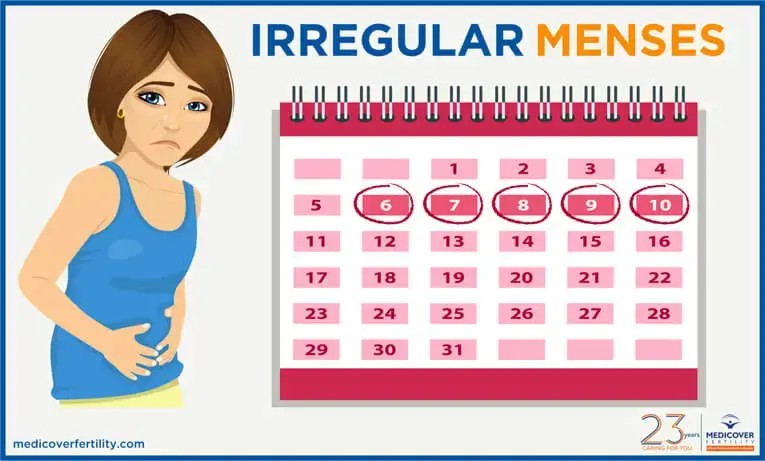An irregular cycle is a menstrual cycle that continually falls outside of “regular” ranges for an unexpected reason.
Some variability in your cycle length is normal. Irregularity is also normal and expected when your periods first begin in life (menarche), and when they are coming to an end (perimenopause). They are also expected after pregnancy, and when stopping or starting a method of hormonal birth control.
In between these times, cycles that are continually irregular can suggest an issue that needs to be addressed with your healthcare provider. Irregular cycles can be caused by behaviors, lifestyle, and environment. They can also be caused by medical conditions that affect your hormones or structural reproductive tract. These conditions often go undiagnosed and untreated.
Cycles that are continually irregular can have a serious impact on short- and long-term health.
RELATED: Reduce Period Bloating
What defines an irregular cycle?
A cycle is considered clinically irregular when the majority of cycles in the previous six months are out of range. People with irregular cycles may notice that their periods happen infrequently, frequently, or are very unpredictable.
Irregular cycle lengths
- Adolescents: Cycles outside the range of 21–45 days
- Adults: Cycles outside the range of 24–38 days
- Adults: Cycles that vary in length by more than 7–9 days (for example, a cycle that is 27 days long for one month
- Periods that suddenly stop for more than 90 days (exceptions include pregnancy, menopause, and recently discontinued hormonal birth control.
Why irregular cycles happen
Here are some of the more common reasons that cycles become irregular. Different causes lead to different types of irregularities
RELATED: How To Overcome Menstruation Cramps
Life stages and pregnancy
- After menarche (the 2–3 years after menstruation begins)
- Perimenopause (as cycles come to an end)
- Pregnancy
- The postpartum period (after a pregnancy)
- Breastfeeding
- Recurrent miscarriages (known or unknown)
Sleep/wake cycles
- Shift work or working night shifts
- Sleep disorders
- Jet lag/long-distance travel
Physical/emotional changes
- Chronic stress
- Intensive exercise
- Substance use/abuse
- Quick weight changes
- Eating disorders (not getting enough calories, binge eating)
- Certain medications
Medical conditions that can cause irregular cycles
- Polycystic ovary syndrome
- Thyroid disorders (hypothyroidism, hyperthyroidism)
- Unmanaged diabetes
- Infections of the reproductive tract
- Uterine polyps
- Uterine fibroids
- Abnormalities of the cervix or vagina
- Certain cancers or benign tumors
- Primary ovarian insufficiency (early menopause)
- Bleeding disorders
- Other medical conditions
Why it matters
Cycles that are continually irregular can have a serious impact on short- and long-term health. They can lead to a wide range of more serious health conditions, and cause distressing symptoms. Menstrual cycle health is related to your heart health, metabolism, sleep, fertility, and more. This is why it’s important to have any potential issues diagnosed as early as possible, and managed with the help of a healthcare provider.
Talking to a healthcare provider
When talking to your healthcare provider, show them your cycle history. Also, tell them if you’ve recently noticed unexpected changes in your body, such as unexplained abdominal pain, difficulty controlling your weight, or unusual hair growth on your face or body. This can help them identify what might be causing your cycle irregularity.
A healthcare provider will probably ask questions about your symptoms and your medical and menstrual history and perform a simple physical exam. In some cases, they may also:
- Ask questions about your full health history, including medical and surgical history, social history, and family history
- Perform blood tests to check the levels of hormones and sugars in the blood. Hormones they will typically check for include testosterone, thyroid hormone, prolactin, and tests of sugar metabolism.
- Perform a pelvic ultrasound (sonogram) of your ovaries and uterus
RELATED: Period Is Coming When These Signs Appears
Managing a clinically irregular cycle will help you to meet your short-term goals, like having a more regular period or becoming pregnant, and long-term goals for staying healthy and well.

